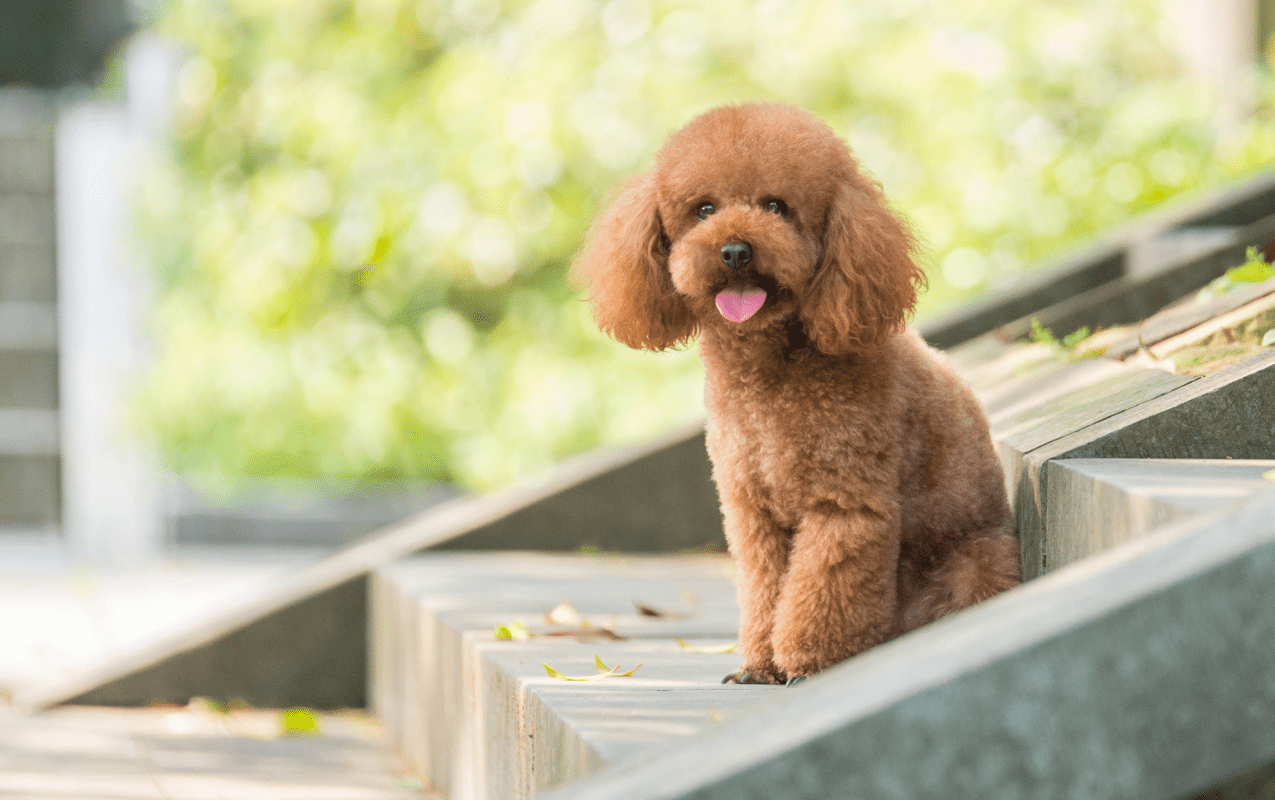Dogs
The Comprehensive Poodle Guide
Poodle Dog Breed
Poodles are one of the world’s most popular dog breeds. And it isn’t hard to see why!
Poodles have a wonderful temperament, an adorable appearance and are an intelligent breed. They also shed minimal dog hair which makes them suitable for a pet owner with allergies.
Beginning out as hunting dogs, modern Poodles are no longer working dogs. They are most commonly kept as a family pet. They are also popular to enter in dog shows and can be trained as therapy dogs.
Poodle History
The first Poodle originated in Germany. It is undetermined exactly when but estimated to be as early as the 1600’s. The first Poodles were the larger Standard Poodle.
They were bred to help hunters retrieve ducks in the water. For this reason, they were bred to be intelligent, active and have a curly coat to keep them warm.
The Germans called them ‘Pudel’ or ‘Pudelin’ which means ‘splash in the water’.
Poodles were soon exported to France, where they were known as ‘Caniche’ meaning ‘duck dog’.
They were favoured by French noblemen as companion dogs. They also began to perform as a circus dog and were trained as truffle hunters, using their strong sense of smell to help sniff them out.
King Louis XVI owned Poodles and the French quickly began to view the Poodle as their national dog. Many today will still call them the “French Poodle” and argue France is where Poodles truly originated from.
The Poodle then began to spread across Europe, becoming most popular in Spain and England.
The Miniature Poodle was then bred, followed by the Toy Poodle. These smaller versions were created by breeding smaller sized Standard Poodles together.
In modern times, Poodles are one of the most popular dog breed worldwide. The American Kennel Club ranks Poodles as the 9th most popular dog breed they register.
Physical Appearance
Poodles are adorable, making them irresistible to those looking to welcome a dog into their family.
They are deep chested dogs with lean bodies, long legs and a long straight tail that sticks upright. Their head is round shaped and they have a long muzzle.
A Poodle’s ears are long and flap down along side their head.
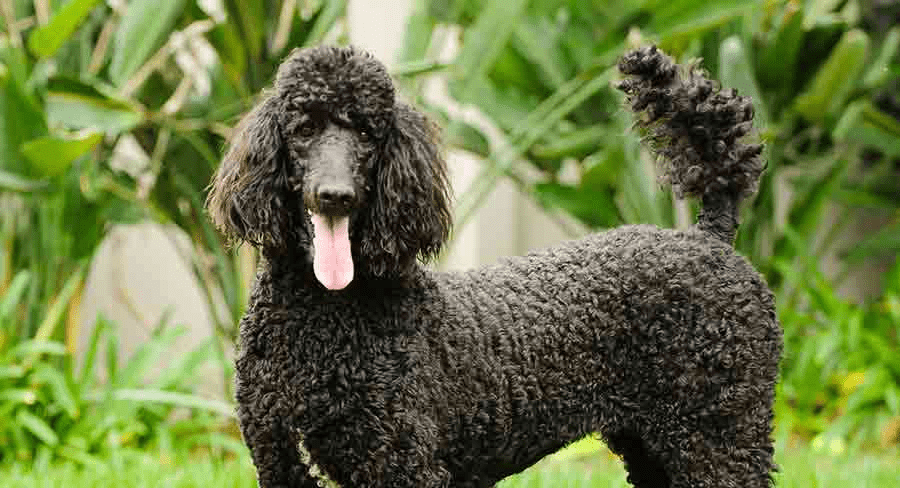
Coat
A well bred Poodle will have thick fur with tight curls. Their coat is super soft, making them extra cuddly pets.
Most Poodles will start out when they are young with a wavy coat. When the puppies are between 6 and 9 months of age, their fur will begin to get curly.
Colours
A Poodle’s coat can come in a wide variety of colours. These include:
- Black
- Brown
- Apricot
- Red
- White
- Silver
- Cream
- Blue – They aren’t actually blue! They are a dark gray or faded black colour.
It is most common for Poodles to be one solid colour. Poodles that have 2 colours in their fur are called Parti Poodles.
The rare Phantom Poodles have black fur with tan sections, similar to the coat of a Doberman.
Poodle Sizes
Poodles come in three different sizes. They all have the same proportions.
Standard Poodle
Standard Poodles grow up to 38cm tall (at the shoulder). They weigh around 20kg.
This variety is the most energetic and will enjoy the challenge of training the most. They are usually more shy than Miniature or Toy poodles.
Miniature Poodle
The Miniature Poodle will grow between 25-38cm tall and weigh around 10kg.
Owners report this size is the most playful and the best with young children.
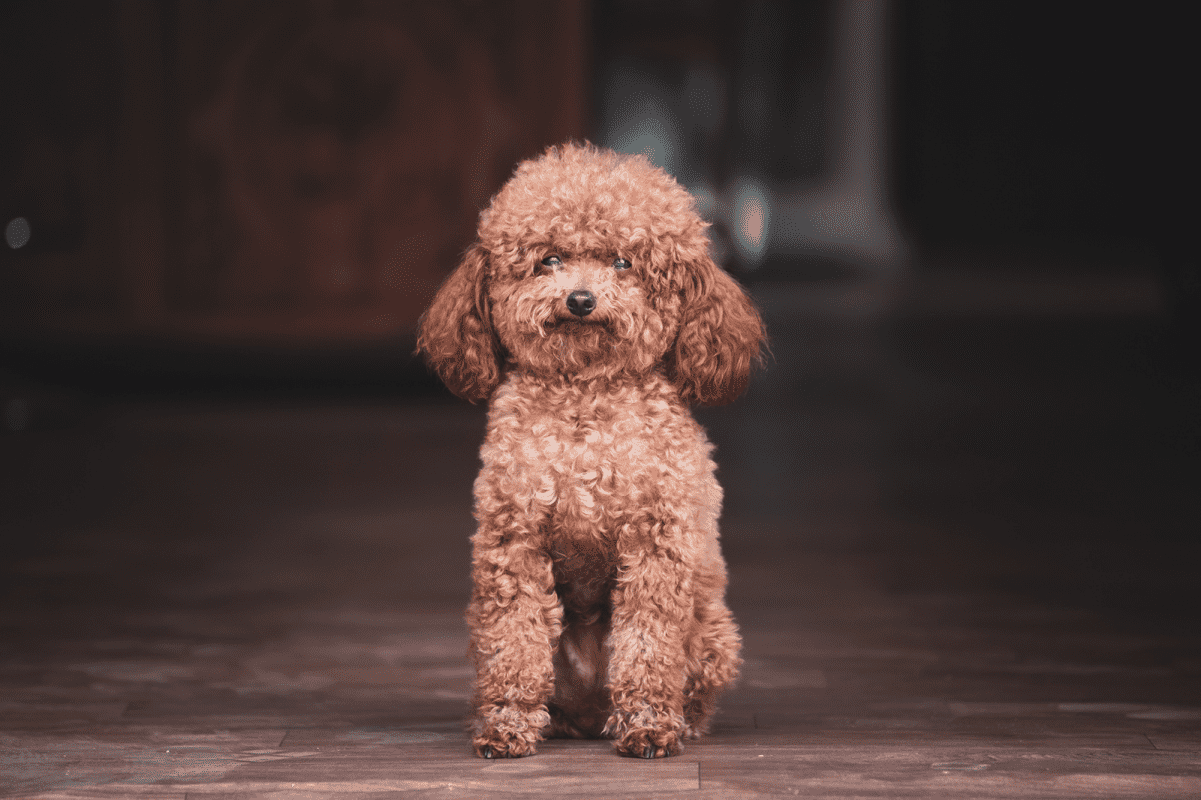
Toy Poodle
Toys stand under 25cm tall and will weigh under 5kg.
The Toy Poodle is the best companion. They are the most likely to develop separation anxiety so don’t let them follow you around every minute of the day.
Teacup Poodle
Some breeders now sell Teacup Poodles, in response to a growing trend for pet dogs to become smaller and smaller.
Teacup Poodles are not technically their own breed and are actually extra small Toy Poodles.
Temperament
Poodles have a beautiful temperament. They are friendly and always happy. If socialised regularly from a young age, Poodles will enjoy interacting with new people and other dogs.
They are very intelligent dogs and probably understand more than you give them credit for! They are people pleasers, making them highly trainable dogs.
However, they can be stubborn. You will need to show them you are the boss.
Many Poodle owners report their Poodles don’t know they are a dog and view themselves as an equal or higher ranking member of your family pack.
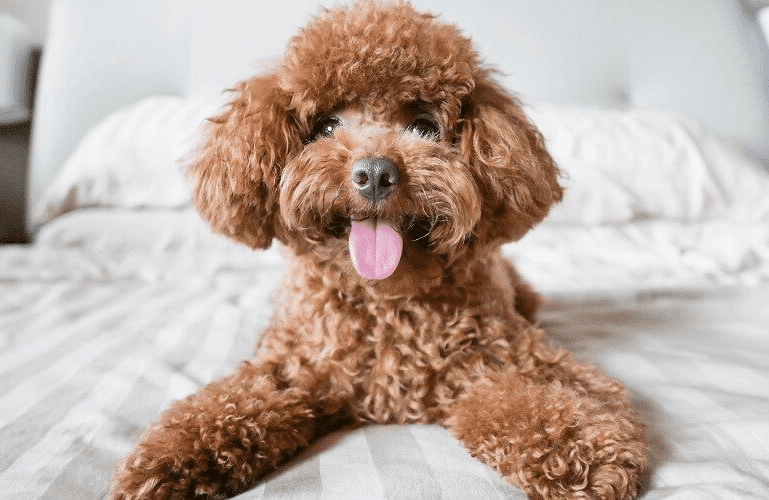
Poodles are also very active dogs. They love to play and be the centre of attention.
They are best suited to households who can commit to walking them every day and playing with them to help wear them out both mentally and physically.
Poodles make wonderful therapy dogs. Their happy and loving nature makes them comforting when engaging with people in nursing homes and hospitals.
While all three size varieties have similar personalities, they can vary slightly.
The Standard Poodle is usually more shy than the smaller varieties, giving them a bad reputation as being ‘sissy dogs’. They also have the highest energy levels.
Miniature and Toy Poodles are said to be the best with children. They can be playful and hyperactive but also very affectionate and cuddly.
The smaller varieties will become more attached to their owners, usually one person in particular, and can become lap dogs if you let them.
They may follow you around more and seem much more dependent. Toy and Miniature Poodles are more prone to developing separation anxiety without proper training.
Health
Overall, Poodles are a healthy breed. They typically live between 14 and 18 years. As with most breeds, the smaller Poodle varieties will live longer than the larger Standard Poodle.
Poodle’s have floppy ears which makes them prone to ear infections. Check and clean their ears regularly.
Like other dogs, they will need to be given regular preventative treatments against fleas, ticks and worms.
It is important that breeders test their dogs to make sure they are not carrying genetic diseases. Healthy parent dogs will lead to healthy puppies.
If you ever have any concerns about your dog’s health, contact a professional veterinarian for advice.
Health Issues
The most common health issues in Poodles include:
- Eye problems including progressive retinal atrophy, glaucoma and cataracts
- Hip dysplasia
- Von Willebrand’s disease (blood clotting)
- Issues with their adrenal glands and hormone production leading to Addison’s disease, Cushing’s syndrome or hypothyroidism
- Epilepsy
The Standard Poodle is prone to:
- Bloat (stomach twists)
- Certain cancers including hemangiosarcoma and insulinoma
Miniature and Toy varieties are prone to:
- Dislocating kneecaps (luxating patellas)
- Dental problems
- Collapsed trachea and breathing difficulties
- Legg-Calvé-Perthes disease (degrading thigh bones)
- Inflammation of the sebaceous glands and hair loss
Poodle Cross Breeds
It is becoming increasingly popular to cross other breeds with purebred Poodles. These mixes are affectionately known as ‘Oodle dogs’.
Breeders cross them so pups will exhibit the best traits of both breeds.
The main reason there is such a huge demand for dogs crossed with Poodles is because of their hypoallergenic coat.
The more Poodle a dog has in its genes, the less it will shed and the more allergy friendly it will be.
The first intentional Poodle cross breed was a Labradoodle in the 1980’s.
A breeder created them after a request from a blind woman to the Australian Guide Dog Association for a hypoallergenic guide dog that would not trigger her severe allergies.
Another reason Oodle dogs are so popular is that they typically inherit the Poodle’s friendly temperament and adorable teddy bear appearance.
Poodles as Pets
Poodles make wonderful pets. Poodles love nothing more than being a member of the family!
The Miniature Poodle and Toy Poodle are smaller and therefore more delicate.
Supervise children when playing with them and teach them to always be gentle with your pets.
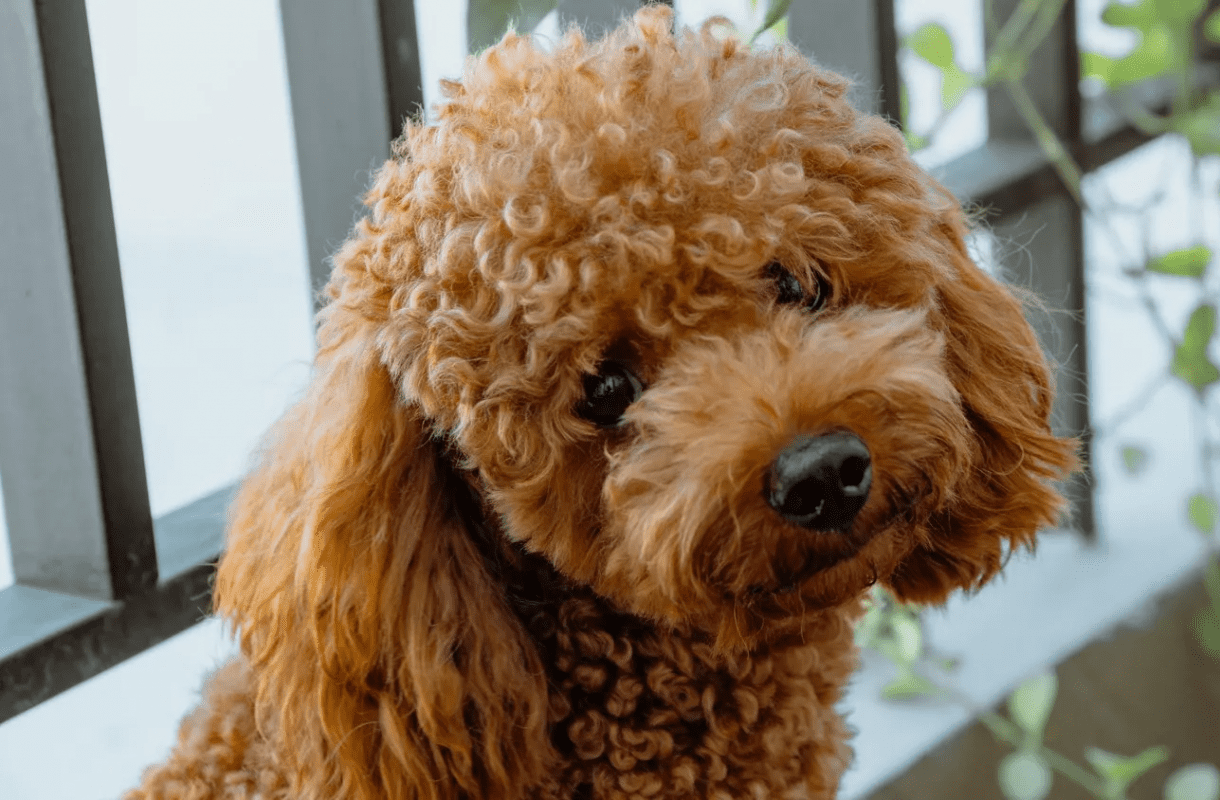
Diet
Feed your pet Poodle a high quality diet of dog food.
Limit feeding your dog too many treats. While treats are a great training tool, feeding them excessively can lead to obesity and related health problems which may shorten your dogs life.
Also be cautious when giving your dog human foods. Not all foods that are safe for humans are also safe for dogs.
Human foods are usually higher in calories too and lack proper nutrition for dogs.
When introducing new foods to your Poodle, seek advice from your veterinarian first.
Hypoallergenic
Poodles are classified as hypoallergenic dogs because they have a non-shedding coat.
Many pet owners with mild dog allergies report they have little or no allergic reaction when around Poodles.
However, pet owners with severe dog allergies may still experience allergic reactions to Poodles.
This is because, like all dogs, they still produce saliva and dander which can cause a reaction.
Because of this, no breeder will be able to 100% guarantee you that your new pet is hypoallergenic. They often refer to Poodles as “allergy friendly” rather than “hypoallergenic”.
Grooming Your Dog’s Coat
The traditional Poodle hair clip is shaved with puffy sections of hair over their head, chest, tail and leg joints. This is called the Continental Clip.
While it may look silly to us, this style has a purpose. Back when Poodles were used as water retrievers, they were shaved to help them move easily in the water and prevent matting in their fur.
Their fur was left long and puffy in those sections to keep their chest and joints warm in the cold water.
The fur on the end of their tail is called a pompon (different to a pom-pom)!
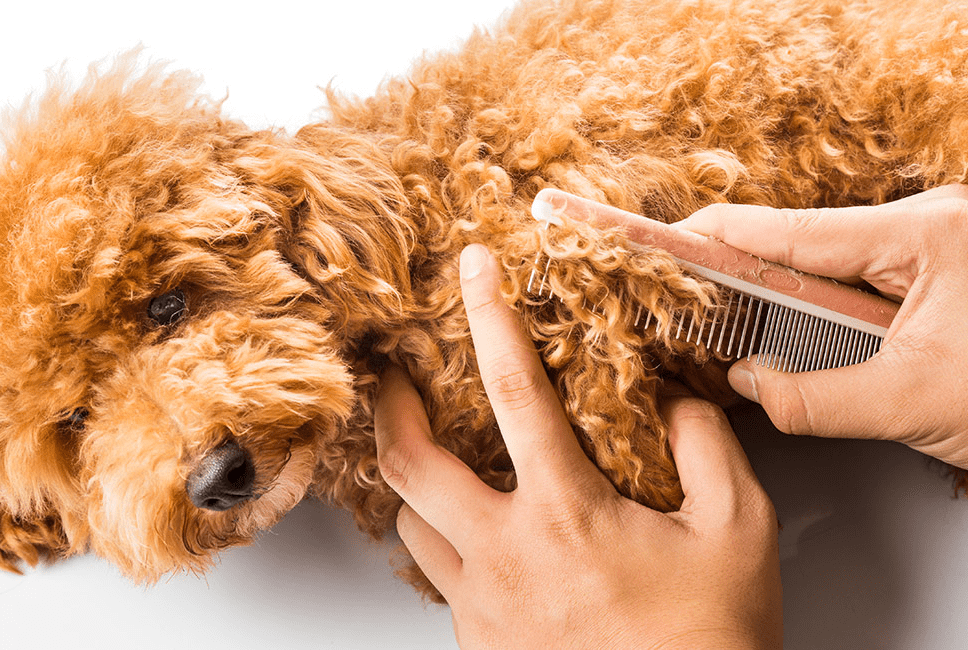
These days, most pet owners prefer to go for the Sporting Clip, which is easier to care for.
This is when the fur on the body is all one, short length. Their head and ear fur is left longer but their face is shaved to keep them tidy.
They still have the pompon on the end of their tail.
A Poodle’s grooming requirements make them high maintenance dogs.
It is recommended you take your Poodle for professional grooming every 6 weeks. They will bath them, cut their hair, clean around their eyes and cut their nails.
You can do it at home yourself but Poodle curls can be difficult to groom if you don’t know what you are doing.
It is recommended you brush your poodle regularly at home, in between groomer visits, as their curly fur can be prone to tangles.
If you leave their fur it will naturally turn into cords, which are similar to dreadlocks in humans.
The Miniature Poodle and the Toy Poodle are prone to dental problems. It is recommended you brush your dog’s teeth regularly with a doggy toothbrush or feed them dental treats.
Exercise
Poodles are high energy dogs. Poodles of all sizes will require a minimum of 60 minutes exercise per day.
Because Standard Poodles are bigger, they are more active and may need even more exercise.
Exercising your dog wears it out both physically and mentally, resulting in a healthier and happier dog. Exercise also benefits your dog’s training as a tired dog is better behaved.
Your Poodle will love going for walks, playing fetch and swimming.
Taking your Poodle to dog parks is a great way to exercise your dog while also teaching it to socialise with other breeds of dog and with people.
If you don’t have the time to walk your Poodle every day, it may be a good idea to hire dog walkers.
Poodles can also be trained to participate in many dog sports such as agility competitions.
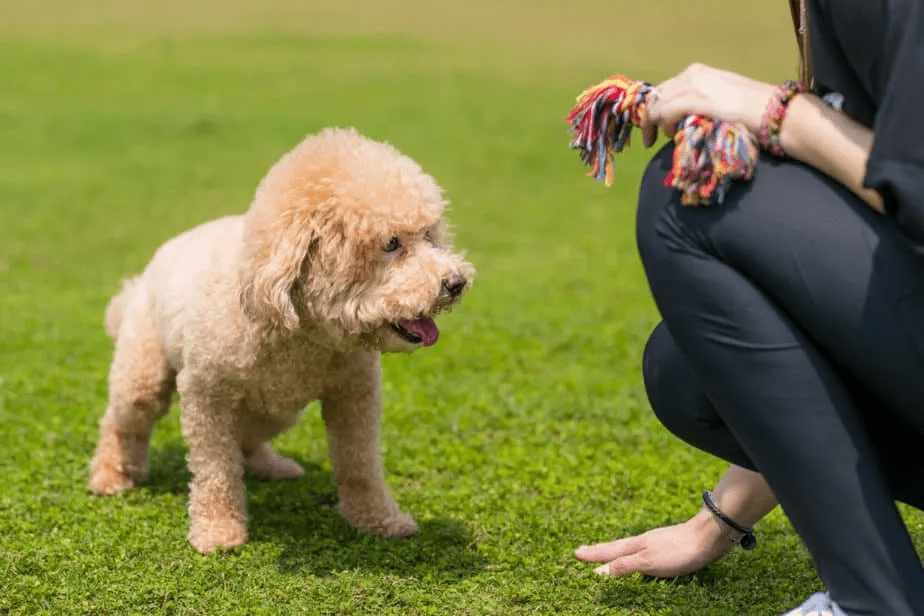
Dog Training
Poodles are highly intelligent and can easily be trained. The earlier you begin obedience training, the easier it will be.
However, they can be stubborn at times. You will need to be patient, firm and consistent with them.
Treat them like your dog and not a king. Otherwise they may think they are top dog and not listen to you.
They respond best to positive reinforcement when they do the right thing, rather than punishments when they do something naughty.
Socialise them from a young age with as many different things as you can – new people, other dogs, other pets, travelling in cars, public places and loud noises.
The more they are exposed to, the more they will be confident around and won’t bark at.
Poodles, particularly Toy and Miniature Poodles, are prone to separation anxiety. Don’t let them follow you around your house constantly.
Train them from an early age that it is okay to be left alone sometimes. If you don’t, they may misbehave when you leave them – excessive barking, going to the toilet in the house or chewing up furniture.
Poodles for Sale – Where to Buy and Price
Poodle Puppy
Buying a Poodle puppy from a professional breeder gives you more choice, including choosing the size variety, sex and colour of your dog.
Ideally look for a family based breeder who will be happy to answer all your questions and invite you to see where their breeding dogs live.
A reputable breeder will always do the appropriate health checks to make sure the puppy’s parents are healthy and they will therefore produce healthy offspring.
They should be able to show you certificates proving these checks have been done.
When you first take a puppy home, it is impossible to tell what health issues may pop up later. So these health checks are important, to help you predict what may happen.
Places to ask for local responsible breeder recommendations include your local Poodle club or kennel club, Facebook groups about Poodles, local dog walkers or veterinarians.
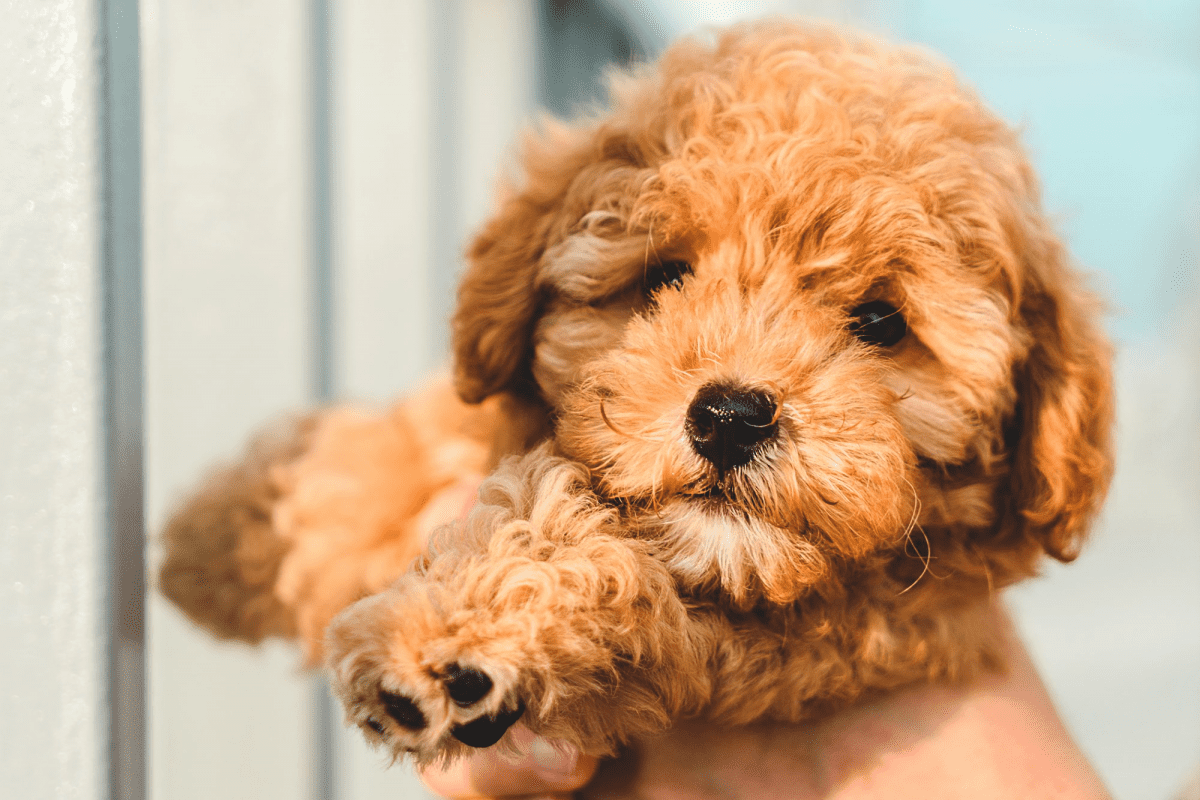
If possible, avoid purchasing from a pet store. It can be tempting because they are so cheap and convenient.
However, they often get their dogs from puppy mills who don’t treat the dogs right.
These dogs are often not tested for genetic diseases so there is no guarantee your puppy won’t end up sick.
Be cautious when buying a dog online and do lots of research. There are lots of scammers out there that will sell you puppies that don’t exist.
Warning signs include dogs being constantly available and being able to pay online with credit card.
If you find an online seller, talk to them on the phone or via video chat. Ask lots of questions and make sure you feel comfortable before paying.
It is not ideal for them to ship you a dog you have never seen as it leaves you stuck if the dog arrives and isn’t exactly what you expected.
A Poodle puppy typically costs around $5,000. This can vary depending on demand, location, colour and size.
Miniature and Toy Poodles can cost more than Standard Poodles as they are often in higher demand.
Poodle Adult
An adult Poodle may be better suited to your lifestyle. Adult dogs are less energetic and usually require less training.
When you adopt an adult dog, you get the chance to assess the dog’s personality and make sure you are compatible. When you buy a puppy, it can be a lucky draw what the dog will be like!
You can adopt adult dogs from local animal shelters or Poodle rescue organisations. You can search online to find rescue groups in your area.
Adopting a dog does limit your choice. It may be hard to find a Poodle or any specific breed.
Then when one becomes available, you may have to act very quickly to secure it before someone else does.
When adopting a dog, ask the organisation questions such as: What is their age? What is their personality and energy level like?
How do they react around children and other animals? How much training do they have? Do they have any known health problems?
After bringing your new dog home, take it to the vet for an overall health check.
Adopting an adult Poodle is cheaper than purchasing a puppy. Adoption fees are usually around $500.
This covers the cost of the dog being vet checked, wormed and desexed.
POODLE BREEDERS AUSTRALIA
POODLE BREEDERS NSW
- Sydney Toy Poodles
Sydney
sydneytoypoodles@gmail.com
https://sydneytoypoodles.com.au/
Size Variety: Toy
- Littleluvles Toy Poodles
Cobbitty
littleluvlestoypoodles@gmail.com
https://www.facebook.com/Littleluvles/
Size Variety: Toy
- Coifico Miniature Poodle
Katoomba
info@coifico.com.au
https://www.facebook.com/Coifico-Miniature-Poodles-226792264001676/
Size Variety: Miniature
- GuanJun Red Toy Poodles
Pymble
https://www.redtoypoodle.net/
Size Variety: Toy
- Oakies Puppies
Inverell
https://www.oakiespuppies.com.au/miniature-poodle.php
Size Variety: Miniature
- Vivid Miniature Poodles
Maitland
https://www.facebook.com/Vivid-Cavoodles-100949778432028/
Size Variety: Miniature
- Kruizen Kennels
Orange
https://www.kruizenkennels.com.au/
Size Variety: Toy & Standard Poodle
- Pudelicious Poodles
Sydney
https://www.facebook.com/PudeliciousPoodles/
Size Variety: Miniature
POODLE BREEDERS VIC
- Cavoodles and Poodles from Helen
Clifton Springs
https://cavoodlesandpoodles.com.au/
Size Variety: Toy
- Poodle Paradise
Castlemaine
shania.theodorakopoulos@gmail.com
https://www.facebook.com/PurebredToyPoodles/
Size Variety: Toy
- Precious Poodles & Cavoodles
Central Goldfields
https://www.facebook.com/preciouspoodlesandcavoodles/
Size Variety: Toy
- Jonallisa Toy Poodles
Patterson Lakes
https://www.facebook.com/jonallisatp/
Size Variety: Toy
- Redsonnet
Little Yarra Valley
0409 106 103
http://toypoodlebreeder.com.au/
Size Variety: Toy
POODLE BREEDERS QLD
- SunshineStar Poodles
Jandowae
http://www.sunshinestarpoodles.com/index.html
Size Variety: Miniature & Toy
- Bryleylou Miniature Poodles
Elimbah
https://www.facebook.com/bryleyloupoodles/
Size Variety: Miniature
- Trevasco Standard Poodles
Rockhampton
https://www.trevasco.com/
Size Variety: Standard Poodle
- Tiny La Toy Teacup Poodles
Sunshine Coast
puppies@tinylatoyteacuppoodles.com
http://tinylatoyteacuppoodles.com/index.html
Size Variety: Toy & Teacup
POODLE BREEDERS SA
- Kirada Poodles
Magill
http://www.kiradapoodles.com/
Size Variety: Standard Poodle
- Sorbey Boazarr Toy Poodles Breeder
Playford
https://www.facebook.com/sorbeyboazarrtoypoodles
Size Variety: Toy
POODLE BREEDERS TAS
- Rainbowluv Poodles
Central Coast
https://www.facebook.com/profile.php?id=100057387672072
Size Variety: Miniature & Toy
POODLE BREEDERS WA
- Perth-Milky’s Dogs
Perth Hills
https://www.perthmilkysdogs.com/
Size Variety: Toy
- Mount Lawley Pets and Puppies
Inglewood
mountlawleypetsandpuppies@iinet.net.au
https://www.mountlawleypetsandpuppies.com.au/
Size Variety: Miniature & Toy
References
http://www.vetstreet.com/dogs/poodle
https://www.akc.org/dog-breeds/poodle-standard/



